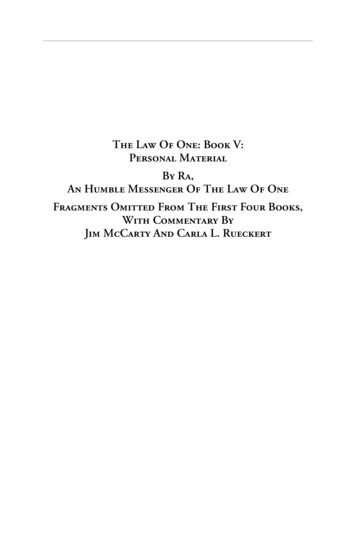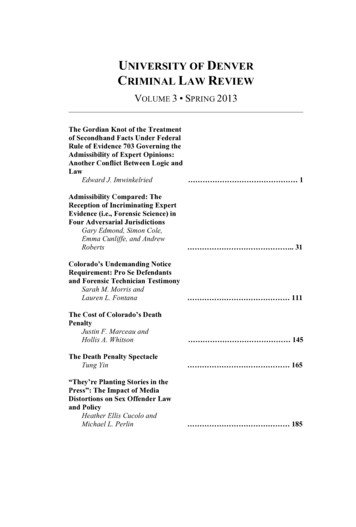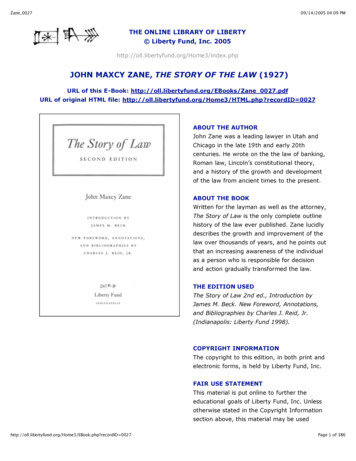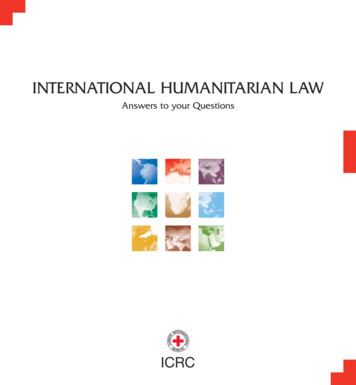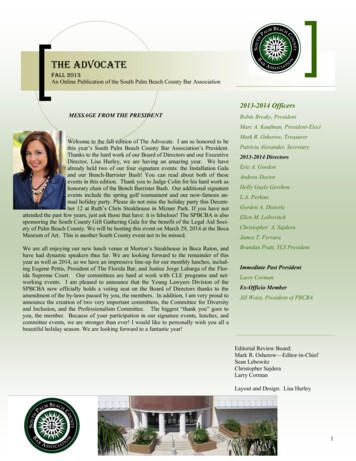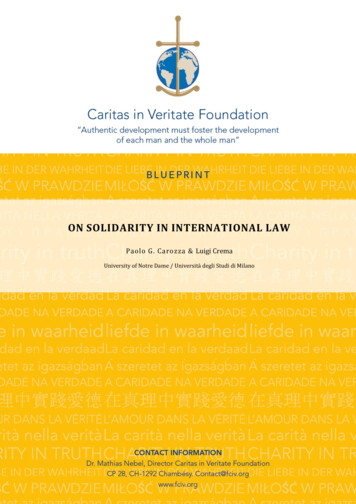
Transcription
ON SOLIDARITY IN INTERNATIONAL LAWPaolo G. Carozza & Luigi CremaUniversity of Notre Dame / Università degli Studi di Milano
ON SOLIDARITY IN INTERNATIONAL LAWProf. Paolo G. Carozza1University of Notre DameDr. Luigi Crema 2Università degli Studi di MilanoABSTRACTThe scope of this reflection is on the actual and possible function of the concept of solidarity ininternational law. The discussion has both a descriptive aim, to examine the place of solidarity withininternational law today, and a normative aim that looks at the desirable evolution of this concept.Although increasingly invoked in the international sphere generally, the concept of solidarity has anuncertain status in international law. Despite having a longer history especially in Christian thought andcertain earlier juridical and political antecedents (some quite contradictory to its use today), its advent ininternational law is relatively new. Solidarity today could be understood in the abstract as a basicobservable condition of the international environment, as a principle of international law, as a (human)right, or as a fundamental moral value. Seen from within the practical experience of international lawtoday, it is best understood as a relatively weak legal principle, which rarely if ever outweighs theinternational legal system’s continuing foundation in the principles of sovereignty and state consent.Solidarity does, however, have stronger underpinnings as a moral value. The place of solidarity inCatholic social teaching deepens our understanding of the possible significance of subsidiarity in theinternational legal system. In Catholic thought, subsidiarity is both a virtue and a moral principle thatcalls all men and women to commit themselves “to the good of all and of each individual.” It is closelyrelated to charity and fraternity, and finds its fullest expression in gratuitousness, or freedom. This inturn leads to a need to reconcile solidarity with the freedom of states in the international sphere,including through the mediating principle of subsidiarity.1Dr. Paolo Carozza is Professor of Law at Notre Dame University. He was a member of the Inter-American Commission onHuman rights and served as its President in 2008–09. At Notre Dame, he is the Director of the Kellogg Institute for internationalStudies. In the Law School, he is Director of the Center for Civil and Human Rights and the Director of the Law School's newProgram on Law and Human Development.2Dr. Luigi Crema is Research Associate at the Università degli studi di Milano, Italy. He was previously Emile Noël Fellow at theJean Monnet Center, New York University.2
The scope of this reflection is on the actual and possible function of the concept of solidarity ininternational law. In this sense, this research will have both a descriptive aim, to examine the place ofsolidarity within international law today, and a normative aim, that looks at the possible, or desirable,evolution of this concept. In addition to the most relevant international legal practice and doctrine andthe work of the Office of the High Commissioner for Human Rights, special regard will be given to thesocial teaching of the Catholic Church, in which the principle of solidarity has a prominent place.3ON SOLIDARITY IN GENERALOn the term “solidarity”Solidum in Latin meant hard, strong, solid, and also whole, full,3 and it was used in law in the expressionin solidum obligari to indicate the obligation in which all common debtors committed themselves to payto the creditor the whole debt.4 This concept is still used nowadays in civil law systems, as, for example,in the Italian legal expression “obbligazione in solido”,5 in Canadian Quebec,6 and in France.7 The wordused in France, already in the 17th century, to describe the common responsibility of a group of debtorswas first solidité,8 and then solidarité.9 If solidum was both a generic and legal term in Latin, in oldmodern French solidarité originated as a legal term.During the French Revolution the term appears to have been used in a more general, not specificallylegal way,10 and by the first half of the 19th century the more general meaning of solidarité appears tohave been established to the point that, in 1848, it was used to describe a political party: “Solidaritérépublicaine”.11 Then, with Émile Durkheim, at the end of the 18th century, the term became part of asociological theory.12 Since then it has come to be commonly used in several languages in this moregeneral meaning: “solidaridad” in Spanish, “solidarietà” in Italian, “solidariedade” in Portuguese,“Solidarität” in German, and “solidarity” in English.Entry Solidum (adj.), Oxford Latin Dictionary (2nd ed. rev.), Oxford University Press, 2012.See the complete account given in the monographic work L. Parenti, «In solidum obligari», Edizioni Scientifiche Italiane,Napoli, 2012. From the same term derives the contemporary term “soldo”, a strong coin created during the 4th century thevalue of which should be stable over time, and later the professional combatants for hire (paid “with the coin”, “al soldo”),from which derives the contemporary “soldato” and “soldier”.5 Arts 1292 and 2055(1) of the Italian Codice civile.6 Arts 1480 and 1526 of the 1991 Code civil of Québec.7 Arts 203, 1382 and 1384(1) of the French Code civil.8 Entry Solidité, Dictionnaire de l’Académie française, 1ère éd., Paris, 1694, p. 485.9 “Solidité, ou Solidarité, signifie en termes de Pratique, Engagement par lequel plusieurs personnes s’obligent les unespour les autres, et chacune pour toutes, s’il est nécessaire. On dit communément Solidarité”, Entry Solidité, Dictionnairede l’Académie française, 5ème éd., Paris, 1798, p. 580, emphasis in the original.10 Mirabeau in 1789 and Danton in 1793 used the terms solidarité and solidaire at the National Assembly in a moregeneral way, cf. F. Brunot, Histoire de la langue française des origines à 1900, tome 9, partie II, Paris, 1937, pp. 669 and745. On the evolution of the term Solidarietà see R. Zoll, Enciclopedia delle scienze sociali, Treccani, 1998, available athttp://www.treccani.it/enciclopedia/solidarieta %28Enciclopedia-delle-scienze-sociali%29/. All the websites referredin the paper have been last visited on 28 February 2014.11 See R. Zoll, above at fn. 8; P. Leroux, De l'humanité, de son principe et de son avenir, Paris, 1840, p. xxi: “Or donc, ce pointfixe, que je crois démontrable. c’est la communion du genre humain, ou, en d’autres termes, la solidarité mutuelle deshommes” (“the reciprocal solidarity among men”, emphasis in the original); A. Comte, A Discourse on the Positive Spirit(1844), William Reeves, London, 1903, p. 118: “The tendency of the new philosophy as a whole will always be to bringinto prominence, in active no less than in speculative life, the tie which unites us to each all, in a multitude of different ways.Thus shall we become unconsciously but deeply imbued with the feeling of social solidarity suitably extended to all timesand spaces.”12 De la division du travail social (1893), Paris, PUF, 2007.34
In 19th century France the term was used to indicate the bond among individuals in a republic under thesame nation, in the same social group, or as part of humanity as a whole,13 while today we can alsoconsider it in reference to states and organizations of different kinds operating at the global level.14 Butthis difference over time should not be considered absolute, since even in its 19th century usage,solidarity could be used to talk about the relationship between nations. For example, the Frenchintellectual and politician Frédéric Bastiat, in a letter in 1844, wrote about “the solidarity between allthe parts of the territory,” adding: “I even think that this solidarity embraces all nations.”15 However, itis not surprising that in the last two centuries solidarity has been used in very different, and evencontradictory, ways. It was a key concept in grounding transnational alliances in the communist struggleof workers, “slaves” against “masters”,16 or from utopians preaching a new world order in the aftermathof World War I.17 It has frequently served to affirm the existence of a common political goal and tostrengthen the bonds among certain nations to the exclusion of others. For example, in the pastsolidarity featured in both the “duty” of European colonial powers to help each other in controlling thecolonized world18 and also in the assertion of “Third World solidarity” against colonial imperialism.19Solidarity then reinforced the alliances of Western liberal states and also the global relations of socialistones, each in opposition to the other. In 1914 Robert Michels noticed that ”in order to establish a groupof solidarity it is a priori necessary to have a sharp contraposition: one is sympathetic to another onlyagainst somebody else. a universal solidarity of a society – solidarity in its purest form. can exist onlybefore certain natural disasters.”20While the word was newly minted, in western tradition the concept has had a longstanding place inChristian thought, embodied in the doctrines of charity and the common good.21 In fact, the new termwas in part introduced to mark a (often explicit) discontinuity with this tradition, by affirming theequality of all human beings not as brothers under the same father, God, but either as members of thesame humanity,22 or under the same nation.23See R. Zoll, above at fn. 8.L. Casini, Solidarity between States in the Global Legal Space, Working Paper of 15 December 2013, pp. 1–2, available athttp://papers.ssrn.com/sol3/papers.cfm?abstract id 2368209.15 Letter to A. M. Laurence, Mugron, 9 November 1844, in The Collected Works of Frédéric Bastiat, Vol. 1 (The Man and theStatesman: The Correspondence and Articles on Politics), Liberty Fund, Indianapolis, 2011, p. 369, athttp://oll.libertyfund.org/titles/2393 2011.16 W. Münzenberg, Solidarität. Zehn Jahre Internationale Arbeiterhilfe 1921–1931, Neuer Deutscher Verlag, Berlin, 1931.17 E. H. Carr, The Twenty Years' Crisis, 1919–1939. An Introduction to the Study of International Relations, II ed., Macmillan,London, 1946, especially pp. 50–53, 75–80, and the critics at p. 85.18 “On le voit, nous admettons pleinement en faveur des États civilisés un droit de direction et de tutelle sur le reste del’humanité. Ce droit dérive de leur devoir. Tous les peuples sont solidaires les uns des autres. La terre nous a été donnée avecses ressources; mais celles-ci peuvent s’épuiser et par conséquent elles doivent être aménagées avec intelligence. Cet ensembled’intérêts communs suffirait pour motiver la solidarité humaine. L’humanité a été remise à sa propre garde. De même qu’àl’intérieur de chaque État les forts sont responsables des faibles, ainsi, dans l’ensemble de l’espèce, les États le plusintelligentes et le plus libéraux doivent protéger et diriger les autres,” J. Hornung, Civilizés et barbares, in Revue de droitinternational et de législation comparée, 18, 1886, p. 204. On the spirit of Berlin and solidarity as harmony amongEuropean civilizing nations see, in the same review, F. de Martens, La Conférence du Congo à Berlin et la politique colonialedes états modernes, ibidem, pp. 113–150 and pp. 244–280, and the preliminary report by Alphonse Rivier, in Annuaire del’Institut de droit international, 8, 1885–86, p. 21 ff.19 V. Prashad, The Darker Nations: A People’s History of the Third World, New Press, New York, 2008; D. C. Thomas, TheTheory and Practice of Third World Solidarity, Praeger, Westport, 2001; see also the Address Delivered by Mr. Anwar elSadat at the First Afro-Asian people's Solidarity Conference, December 26, 1957, oasian1.asp.20 R. Michels, Zum Problem: Solidarität und Kastenwesen, in Probleme der Sozialphilosophie, Leipzig-Berlin, 1914, p. 55.21 See Section 3 below; see also Casini, above at fn. 12, p. 5 ff.22 Leroux, above at fn. 9, which explains the superiority of solidarity among men over Christian charity.13144
International law and solidarity: a look at the pastOn solidarity and early 20th century international lawThere is no longstanding tradition of solidarity in international law.24 As noted by Philip Dann in apresentation given a few years ago, “solidarity” is hardly used even in legal documents that concerndevelopment cooperation.25 During the last several centuries international law has been basedprincipally on the idea of sovereignty, affirming the independence of the rising nation states andempires after and against the previously united theological and imperial frameworks.26 With the term“sovereignty” we intend grosso modo the ability of a political entity to have primary, and in many casesexclusive, jurisdiction within its own territory, and the ability to freely maintain or reject internationalrelationships with other political entities.27 This is the traditional framework of modern international lawbased on the liberal paradigm of states represented as free legal entities meeting in the internationalarena, without any superior authority.28International law scholars have reflected on whether the deep changes in the life of internationalsociety are leading to a new international law, no longer based only on nation(alism)s and sovereignty,but on superior principles, goals, and authorities. Such theorizing is as old as modern international lawitself, if we consider the debate between natural lawyers and voluntarist positivists of the past29 (thevoluntaristic being those theories of international law which dominated in the late 19 th and 20thcenturies and recognized the existence of international law inasmuch as it was explicitly accepted bystates through their will, through their consent30). As Philip Allott noted in regard to the similarities anddifferences between the thought of Vattel and Wolff, both working on a theory of international law inthe mid-18th century, contemporary global society would be significantly different if, instead of thesovereigntist construction of Emer de Vattel, the civitas maxima vision of Christian Wolff hadprevailed.31More recently, strict voluntarism and sovereignty have both been challenged both in political terms,with globalization taking the place of the previous politics of nations and then blocks, and in legal terms,Cf. R. Zoll, ibidem at fn. 8; L. Wilde, Global Solidarity, Edinburgh University Press, Edinburgh, 2013, pp. 18–67. pp. 80–81.H. Brunkhorst, Solidarity. From Civic Friendship to a Global Legal Community, MIT Press, Cambridge, 2005, at p. 11 ff., and55–77.24 R. B. Dos Santos Alves, Human rights and international solidarity, Working paper, 15 June 2004, Economic and SocialCouncil, Commission on Human Rights, Sub-Commission on the Promotion and Protection of Human Rights, Doc.E/CN.4/Sub.2/2004/43.25 P. Dann, Solidarity and the Law of DevelopmentCooperation, in R. Wolfrum, C. Kojima (eds), Solidarity: A StructuralPrinciple of International Law, Springer, Heidelberg, 2010, p. 56.26 E.-W. Böckenförde, La formazione dello Stato come processo di secolarizzazione, Morcelliana, Brescia, 2006 (DieEntstehung des Staates als Vorgang der Säkularisation und Utopie, 1967).27 T. Treves, Diritto internazionale generale, Giuffré, Milano, 2005, chap. 1. J. Crawford, Sovereignty as a Legal Value, in J.Crawford, M. Koskenniemi (eds), The Cambridge Companion to International Law, Cambridge University Press, Cambridgeetc., 2012, pp. 117–133.28 E. Vattel, Droit des gens, Neuchâtel, 175 8. On the concept of sovereignty throughout history see M. Loughlin,Foundations of Public Law, Oxford University Press, Oxford etc., 2010, especially pp. 50–90.29 On this debate is particularly concise and well-argumented R. Kolb, Doctrines sur le fondement du droit des gens,Pedone, 2007 (Réédition augmentée et mise à jour de l’ouvrage de A. Truyol y Serra, Doctrines contemporaines du droit desgens, Pédone, 1951).30 H.G. Jellinek, System des Subjektiven offentlichen Rechts, Freiburg, 1892; H. Triepel, Völkerrech und Landesrecht, Leipzig,1899; D. Anzilotti, Teoria generale della responsabilità dello stato nel diritto internazionale, Firenze, 1902.31 P. Allott, The Health of Nations: Society and Law Beyond the State, Cambridge University Press, Cambridge etc., 2002, p.418: “If Christian Wolff had written in simple and lucid French like Vattel, or in excited and exciting French like the otherSwiss citizen of great influence, Jean-Jacques Rousseau, the world’s conception of itself might have been different, thestory of the twentieth century might have been different.”235
with international cooperation integrated into widely institutionalized regimes. These shifts raised anew wave of re-conceptualization of international law and its structure. In a famous course given at TheHague, Professor Bruno Simma, later a Judge at the International Court of Justice, highlighted the shiftof the international legal paradigm from bilateral to community interest based.32 Many authors areworking on various theories of constitutionalization of international law,33 and others on its“humanization”, with this term marking a stark discontinuity with the previous centrality of the state ininternational law.34 In these shifts the concept of solidarity plays little role as such, although it can befound in the background.French solidarismHowever, both in the past and today, there have been some attempts to characterize the internationalcommunity under “solidarity”. In the past, the only notable example is the so-called “solidarism” of LéonDuguit and George Scelle.35 This latter author,36 influenced by the solidarist work of Léon Bourgeois37 inthe preface of his manual of international law, wrote:Every international lawyer relies on a certain philosophical-legal doctrine that dominates histhought. in the Law of Nations, doctrines not only change, but also oppose each other.The evolution of the social constructs, of economic conditions, of the media, have turnedupside down the equilibrium of the groups of human peoples. Universal solidarity leans onnew bases. The interdependence of States, which classical theory had observed, has needsthat it had barely intuited. The contraposition among political societies is not the essentialphenomenon anymore: they overlap, interpenetrate, mix, in a world every day moreshrunken and excited, so much so that the old deductions coming from the individuality ofpeoples and their exclusive psychology are contested today. Internationalism is today thecapital fact. Therefore, the mentality of individuals and of groups can never be against it.38Then he goes on to explain that the use of power to regulate international relations is fundamentallyagainst the spirit of an international solidarity regulated by the law of nations:If it is necessary to consider power, it is only to submit it to the Law or to use what it has inconformity with solidarity, and that is indispensable to the social organization. When weconsent, under the excuse of realism, to consider the compromise allegedly necessaryB. Simma, From bilateralism to community interest in international law, Recueil des Cours, Vol. 250, 1994, pp. 217–384,in particular p. 223 ff., warning that “bilateralist international law still constitutes the basis on which the newdevelopments are taking shape”, but noting that “rising awareness of the common interests of the internationalcommunity, a community that comprises not only States, but in the last instance all human beings, has begun to changethe nature of international law profoundly”, p. 234. See also before M. Lachs, The development and general trends ofinternational law in our time, Recueil de Cours, Vol. 169, 1980 (IV), p. 72 ss. and N. Politis, La morale internationale, LaBâconnière, Neuchâtel, 1943, p. 84 ss.33 See among many J. Klabbers, A. Peters, and G. Ulfstein , The Constitutionalization of International Law, Oxford UniversityPress, Oxford etc., 2009.34 Cf. A.A. Cançado Trindade, International Law for Humankind: Toward a New Jus Gentium, (2nd rev. ed.), Nijhoff, Leidenetc., 2013, and T. Meron, The Humanization of International Law, Nijhoff, Leiden etc., 2006, assessing the impact of humanrights on international law.35 For a comprehensive summary of this movement see M. Koskenniemi, The Gentle Civilizer of Nations, CambridgeUniversity Press, Cambridge etc., 2001, pp. 284–316.36 For an overview on his thought see H. Tierry, The European Tradition of International Law: Georges Scelle, in EuropeanJournal of International Law, 1, 1990, pp. 190–207.37 L. Bourgeois, Solidarité, 3rd ed., A. Colin, Paris, 1902.38 Preface of G. Scelle, Précis du droit du gens, Vol. 1, 1932, p. viii (translation by the authors).326
between the aspirations of power and the rules of solidarity as an element of positive law,we stop doing legal realism, and we just confuse law and politics.39Then he completes the circle of its reasoning referring to a federal world system in which local solidarityamong citizens and general solidarity among nations are both preserved.40 Even if these words werewritten in the early 20th century, the many points on globalization and the description of society (withthe emphasis on media and change) may as well have been written today. Notwithstanding this attemptto frame international law with the concept of solidarity, this doctrine did not give rise to a prolificschool. As observed by the distinguished international law scholar Jean-Pierre Cot, former internationaljudge at the International Tribunal for the Law of the Sea: “The fuzzy legal construction of Léon Duguitand Georges Scelle did not survive. [H]is concept of solidarity, based on the “droit objectif”, has notsurvived. I cannot quote a contemporary French international scholar operating within that legalframework.”41Solidarity and international law todayToday the panorama of international legal thought remains fairly sparse, as other ideas are more deeplyexplored by legal scholars. However, certain authors with experience in international courts havepresented their ideas on this concept, such Professor Karen Wellens, Ronald St.J. MacDonald, professorand former Judge at the European Court of Human Rights, Rüdiger Wolfrum, former director of the MaxPlanck Institute of International Law in Heidelberg and former President of the International Tribunal forthe Law of the Sea, and the Judge of the International Court of Justice A. G. Koroma.42 In addition tothese authors, the UN Commission on Human Rights has found many references to the concept, mostlyimplicit, and more recently also explicit.43Nevertheless, the place of solidarity in international law remains uncertain.44 Mostly, the scholarsmentioned above consider it to be a constitutive principle of the international community. However, theconcept has several other facets that can be explored, as we will do in the following pages. An overlap ofmeanings is frequently evident in writings on the topic. For example, in the preliminary report onsolidarity in international law, elaborated by Rui Baltazar Dos Santos Alves in 2004 for the SubCommission on the Promotion and Protection of Human Rights of the Commission on Human Rights ofthe UN Economic and Social Council (UN Commission on Human Rights) the concluding six paragraphsuse, in a variety of different contexts, the expressions: “principle of international solidarity”,Ibidem, pp. xix–x (translation by the authors).Ibidem, p. 188.41 Discussion Following the Presentation by Philip Dann, in Wolfrum, Kojima, above at fn. 23, pp. 81–82.42 R. St. J. MacDonald, Solidarity in the Practice and Discourse of Public International Law, in Pace International Law Review,8, 1996, pp. 259–302. K. Wellens, Solidarity as a Constitutional Principle: Its Expanding Role and Inherent Limitations, in R.St. J. MacDonald and D. M. Johnston (eds), Towards World Constitutionalism: Issues in Legal Ordering of the WorldCommunity, Nijhoff, Leiden etc., 2005, p. 775 ff.; his opinion, evolved, appeared more recently in Revisiting Solidarity as a(Re-)Emerging Constitutional Principle: Some Further Reflections, in Wolfrum, Kojima, above at fn. 23, p. 3 ff. R. Wolfrum,Solidarity amongst States: An Emerging Structural Principle of International Law, in Indian Journal of International Law, 49,2009, pp. 8–20. A. G. Koroma, Solidarity: Evidence of an Emerging International Legal Principle, in H. P. Hestermeyer, D.König, N. Matz-Lück, V. Röben, A. Seibert-Fohr, P.-T. Stoll, S. Vöneky, Coexistence, Cooperation and Solidarity. LiberAmicorum Rüdiger Wolfrum, Nijhoff, Leiden etc., 2012, Vol. I, pp. 103–129.43 See early on Dos Santos Alves, Human rights and international solidarity, Working paper, 15 June 2004, Economic andSocial Council, Doc. E/CN.4/Sub.2/2004/43, Commission on Human Rights, Sub-Commission on the Promotion andProtection of Human Rights.44 R. B. Dos Santos Alves, above at fn. 22, paras 32–37.39407
“international solidarity”, “international solidarity . [as] a fact of international society”, and “right/dutyof international solidarity”.45 Because the existent literature uses solidarity in several ways, the firstpoint to be clarified is whether the concept of solidarity is best qualified as a fact and condition, aprinciple, a right, and/or a value. Second, considering the above-mentioned theories on the evolution ofinternational law, one must ask whether the concept of solidarity adequately captures this evolutionand whether (and if so, how) solidarity in international law can be reconciled with sovereignty. Theseare the animating questions of the following section.THE CONCEPT OF SOLIDARITY IN INTERNATIONAL LAWQualifying solidarityThe concept of solidarity is used in international law in several ways, in particular as a fact andcondition, a principle, a value, and/or a right. Solidarity as a fact or condition refers to the sociability ofstates as opposed to their autonomy or self-sufficiency. Every act of cooperation, in this light, can betaken as evidence of the sociability of states. Regarding solidarity as a principle, or as a structuralprinciple, highlights the inner structure of international relations and the suitability of this principle inshaping the application of international relations, and to evaluate the scope and importance of thisprinciple in relation to other principles of international law, such as sovereignty, subsidiarity, good faith,and equity. Solidarity as a value means to use it as a normative criterion for evaluating and judging therightness of a given set of facts, and for fostering measures to strengthen cooperation. To qualifysolidarity as a right implies how it expresses a legitimate claim (of justice), and a correlative positiveduty to act or refrain from acting. As we have already seen in some of the documents cited earlier, isquite possible that solidarity could be used in more than one of these senses simultaneously, especiallygiven the multilayer composition of international society, in which solidarity does not necessarily applyonly among states, but could also affect the relationship between states and individuals of other states.Solidarity as a fact or conditionSolidarity, as a fact or social condition, is illustrated by reference to several areas in which statescooperate today towards a common goal. Mohammed Bedjaoui, Judge Abdul Koroma, and HolgerHestermeyer, for example identified solidarity with communities working together towards commongoals.46 In this very broad general meaning solidarity becomes one aspect of the Aristotelian zoònpolitikòn, as synonymous with the sociability of every person and every human expression, such asstates. Such a broad conception had already emerged, for example, in the preliminary report elaboratedby Dos Santos Alves for the UN Commission on Human Rights, in 2004:Solidarity implies a communion of responsibilities and interest between individuals, groups,nations and States. The notion of solidarity. corresponds with the notion of cooperation,because one only cooperates in an act of solidarity. Solidarity is one of the greatest values inthe construction of human rights. Resort to the use of the word cooperation, first in the45Ibidem, paras 32–37.Koroma, above at fn. 40, p. 103. Similarly see also M. Bedjaoui, International Law: Achievements andProspects, 1991, p. 14, using solidarity in the general sense of working together towards the common good. H.P. Hestermeyer, Reality or Aspiration? Solidarity in International Environmental and World Trade Law, inHestermeyer et Al., above at fn. 40, p. 45 ff., distinguishes between this kind of solidarity, coming from apolitical will to act together, and an altruistic solidarity.468
Charter of the United Nations, later in most of the documents emanating from theOrganization, is the main indication that solidarity has undergone a long and difficultjourney.47A similar, broad approach can also be read in the preliminary report elaborated by Rizki for the sameCommission in 2006, where he establishes the mandate of his work:The notion of solidarity corresponds to the notion of cooperation, because one could onlycooperate in an act of solidarity.48In such a broad meaning, solidarity becomes almost synonymous with cooperation, and as such it iscoessential to law itself, international law included. Certainly nowadays international cooperation iseverywhere, and the progress of cooperation of states is undeniable: there are regulations accepted andshared in widely varying areas of international law. Every international, bilateral, regional or universaltreaty, from the UN Charter to the Treaty on the European Union and the World Trade Organizationagreements to the Bilateral Investment Treaties, shows the cooperative nature of states today, asopposed to an isolated one. Solidarity as a common reality can also be seen in joint missions of states,as Chile and Peru recently stressed before the International Court of Justice in the
Studies. In the Law School, he is Director of the enter for ivil and H uman Rights and the Director of the Law School's new Program on Law and Human Development. 2 Dr. Luigi Crema is Research Associate at the Università degli studi di Milano, Italy. He was previously Emile Noël Fellow at the Jean Monnet Center, New York University.


